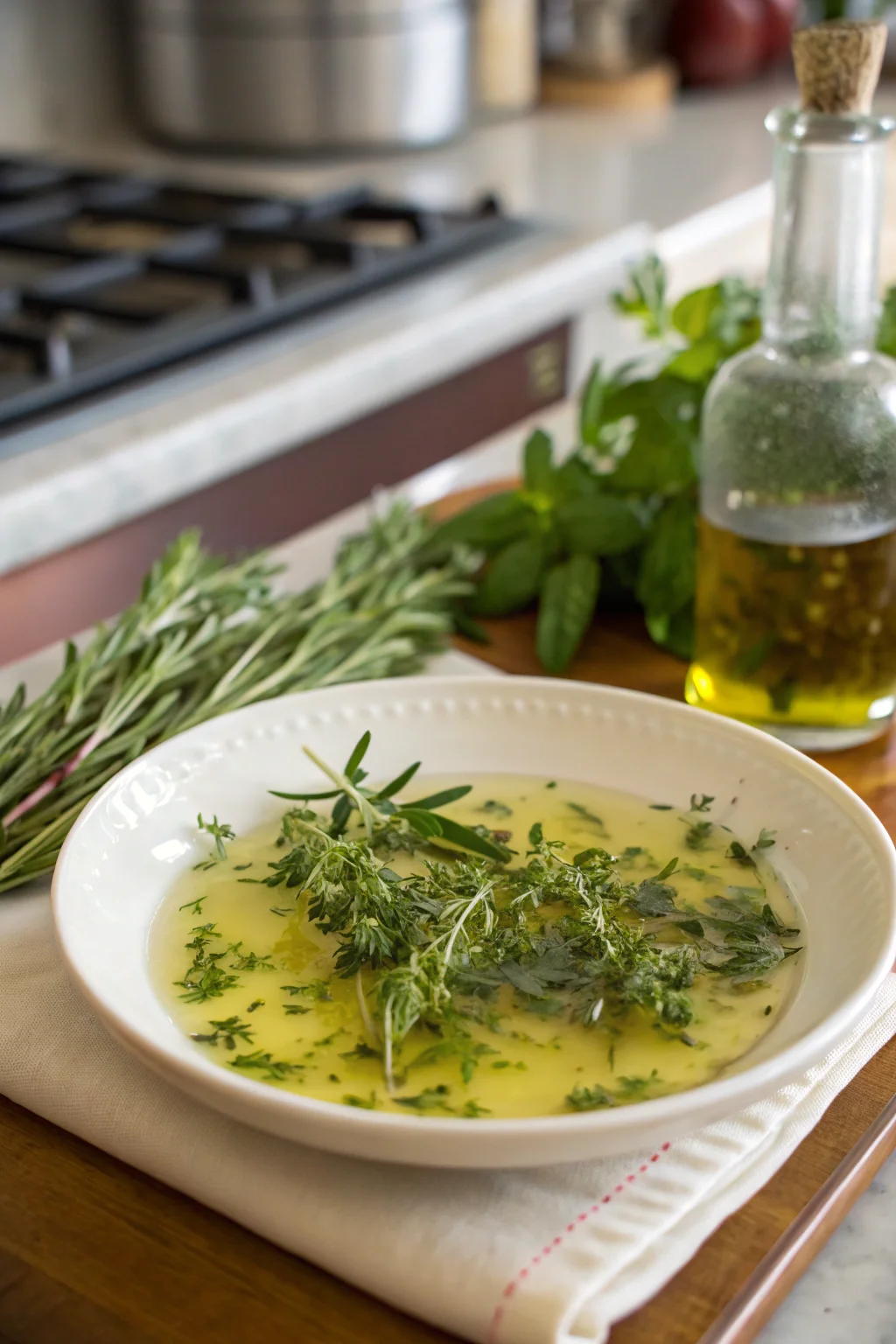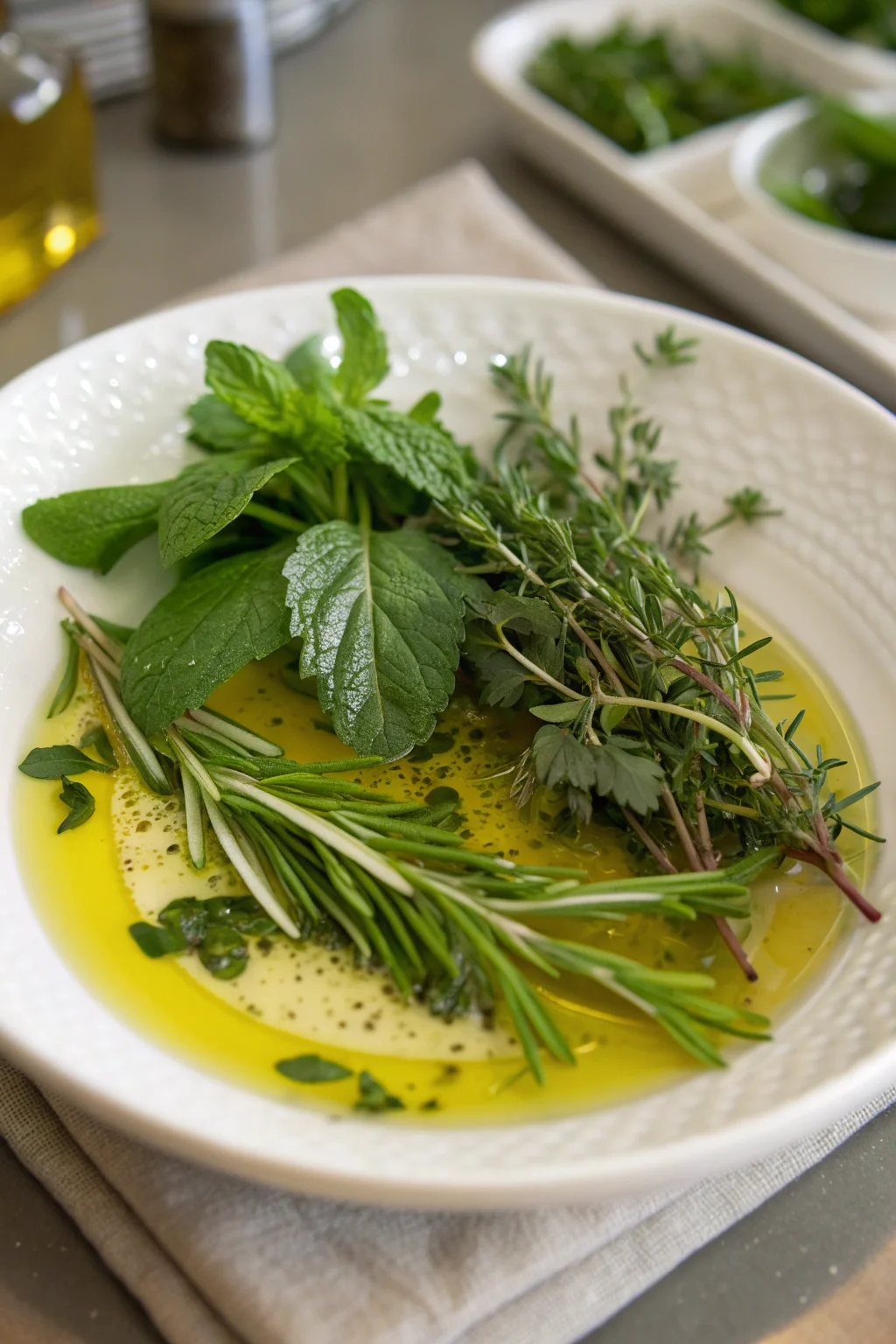Can You Freeze Fresh Herbs in Olive Oil? | Kitchen Hack
Freezing fresh herbs in olive oil is a clever kitchen hack that can preserve the vibrant flavors of your favorite herbs for months. This method not only extends the shelf life of herbs but also makes them easy to use in cooking, eliminating the need for chopping or measuring. Whether you’re a seasoned home chef or a beginner, this guide will walk you through the most common questions about freezing fresh herbs in olive oil.
Table of Contents
What Are the Benefits of Freezing Herbs in Olive Oil?
Freezing herbs in olive oil offers several advantages:
Preservation: It extends the shelf life of herbs significantly. Fresh herbs like basil, thyme, and rosemary can wilt or spoil quickly when left in the fridge. By freezing them in olive oil, you can enjoy their fresh taste for up to six months, reducing the frequency of trips to the grocery store.
Convenience: Pre-measured portions simplify cooking. Each cube contains a consistent amount of herbs and oil, making it easy to add to dishes without having to measure out ingredients. This is especially helpful for busy weeknight dinners or when you’re cooking in a hurry.
Flavor Retention: The oil helps lock in the herbs’ natural flavors. Unlike drying, which can sometimes lead to a loss of volatile oils and aromatic compounds, freezing in oil helps retain the full flavor profile of the herbs.
Reduced Waste: Utilize excess herbs before they spoil. If you buy a bunch of parsley for a recipe and have leftovers, this method allows you to preserve the remainder in a way that’s ready to use next time.
This method is especially useful for those who enjoy cooking with fresh herbs but don’t always use them quickly enough to avoid waste. By having these flavorful cubes on hand, you’re always prepared to enhance your meals with the essence of fresh herbs.
How Do You Prepare Herbs for Freezing in Olive Oil?
To prepare herbs for freezing:
Wash and Dry: Rinse herbs under cold water and pat them dry with a paper towel. It’s crucial that the herbs are completely dry before you proceed to the next step, as any remaining water could cause ice crystals to form, which might affect the texture and flavor of the herbs when thawed.
Chop: Finely chop the herbs to your desired size. Smaller pieces will freeze and thaw more evenly, and will also distribute more consistently throughout your dishes.
Measure: Place about one tablespoon of chopped herbs into each compartment of an ice cube tray. If you prefer larger portions, feel free to adjust this amount according to your cooking style.
Add Oil: Pour olive oil over the herbs, filling each compartment. Be careful not to overfill; leave a small gap at the top of each compartment to allow the oil to expand as it freezes.
Freeze: Place the tray in the freezer until the cubes are solid. This usually takes a few hours, but leaving them overnight ensures they’re completely frozen.
This step-by-step process ensures your herbs are ready for future use. Once frozen, you can pop the cubes out of the tray and store them in labeled freezer bags or containers, making them easy to grab when needed.
Which Herbs Can Be Frozen in Olive Oil?
Most herbs can be frozen in olive oil, including:
Basil: Great for Italian dishes such as pesto, pasta sauces, and bruschetta. Basil freezes particularly well in olive oil, maintaining its sweet and peppery flavor.
Thyme: Perfect for roasts and stews. Thyme retains its earthy and slightly minty taste, which complements hearty dishes like beef stew or roasted vegetables.
Rosemary: Adds flavor to meats and potatoes. Its robust, pine-like flavor is excellent for seasoning lamb or chicken dishes.
Sage: Complements poultry and pork dishes. Sage has a slightly peppery taste with hints of lemon and eucalyptus, making it ideal for stuffing and sausage recipes.
Parsley: Ideal for soups and sauces, parsley’s mild, fresh taste can brighten up a variety of dishes from tabbouleh to chimichurri.
However, avoid freezing herbs with high moisture content like lettuce or cilantro, as they may become mushy. Cilantro, for instance, tends to lose its vibrant flavor and become limp when thawed, making it less suitable for direct use in dishes where its fresh flavor is desired.
How Long Do Herbs Last When Frozen in Olive Oil?
Herbs frozen in olive oil can last up to 6 months when stored properly. For the best results:
Use Airtight Containers: Once frozen, transfer cubes to a labeled, airtight container or freezer bag. Removing as much air as possible helps prevent freezer burn and maintains the quality of the herbs.
Avoid Frequent Thawing: Only thaw the amount needed to prevent loss of flavor and texture. Repeated thawing and refreezing can degrade the quality of the herbs.
Check for Freezer Burn: Discard any cubes that show signs of freezer burn, such as discoloration or an off smell. Freezer burn occurs when air reaches the food, causing it to dry out and develop an unpleasant taste.
Proper storage maintains quality and flavor over time. Keeping your frozen herbs organized and labeled can also save time when preparing meals, as you’ll know exactly what you have and when it was frozen.
Can You Use Any Type of Olive Oil?
Yes, you can use any type of olive oil, but extra-virgin olive oil is recommended. It offers:
Superior Flavor: Rich, robust, and enhances the herbs’ natural taste. Extra-virgin olive oil is produced by cold pressing olives and retains more of the fruit’s flavor and aroma compared to regular olive oil.
Health Benefits: Contains antioxidants and healthy fats. It’s a good source of monounsaturated fats which are beneficial for heart health, and it contains polyphenols that have anti-inflammatory properties.
Versatility: Suitable for most cooking applications. Its high smoke point makes it ideal for sautéing, roasting, and even drizzling over finished dishes for added flavor.
Ensure you use high-quality olive oil for the best results. While it may be tempting to use a cheaper oil, the flavor of the oil will impact the overall taste of your dishes, so using a good quality extra-virgin olive oil can make a significant difference.
What Dishes Can Benefit from Herb and Olive Oil Cubes?
Herb and olive oil cubes are versatile and can enhance many dishes, such as:
Soups and Stews: Add depth of flavor. Drop a cube into the pot while sautéing onions or other base ingredients to create a rich, aromatic base for your soup or stew.
Roasts: Infuse meats with herbaceous taste. Place a cube on top of a roast before baking, allowing the oil to melt and permeate the meat with flavor.
Sautéed Vegetables: Quick and flavorful side dishes. Toss the cubes into a pan with your favorite vegetables for a quick, flavorful side dish that complements any meal.
Pasta Sauces: Elevate simple tomato or cream sauces. Melt a cube into your sauce for an instant boost of flavor, perfect for transforming a basic dish into something truly special.
Simply add a cube to your pan or pot during cooking. The combination of herbs and olive oil can enhance the flavor profile of a dish without overpowering it, providing a subtle yet impactful addition.
Can You Mix Different Herbs in One Cube?
Yes, mixing different herbs in one cube is a great way to create custom blends. Popular combinations include:
Basil and Oregano: Perfect for Italian recipes. This classic combination is excellent for pasta sauces, pizza, and marinades.
Thyme and Rosemary: Ideal for roast meats. These robust herbs pair well together and are often used in Mediterranean and French cuisine.
Parsley and Chives: Great for garnishing. Their mild flavors complement each other, making them a great finishing touch for soups, salads, and baked potatoes.
Experiment with different combinations to suit your taste preferences. Creating your own herb blends allows for creativity in the kitchen and can inspire new dishes and flavor profiles.
Do You Need to Thaw Herb and Olive Oil Cubes Before Use?
No, there’s no need to thaw the cubes before use. Simply:
Add Directly to Cooking: Drop the frozen cube into your dish while cooking. The heat of the pan or pot will quickly melt the oil and release the flavors of the herbs.
Use in Sautéing: Melt the cube in a pan as a base for sautéing vegetables or meats. The oil provides a flavorful foundation for cooking, eliminating the need for additional oils or butter.
This saves time and effort in meal preparation. By skipping the thawing step, you can streamline your cooking process and incorporate fresh herb flavors in a matter of seconds.
Are There Any Alternatives to Freezing Herbs in Olive Oil?
Yes, there are alternatives, like:
Freezing in Water: Suitable for soups, but may dilute flavor. Freezing herbs in water is a simple method, but it’s best reserved for dishes where the added water content won’t affect the consistency, such as broths or stocks.
Drying: Preserves herbs, but changes texture and flavor. Drying is one of the oldest preservation methods and works well for herbs like oregano, thyme, and rosemary, which retain their flavor when dried.
Vinegar Preservation: Ideal for infusing herbs into dressings. Herbs preserved in vinegar can be used to make flavorful vinaigrettes or to add a tangy note to marinades.
Each method has its own benefits depending on your cooking needs. Consider the intended use of the herbs and choose a preservation method that aligns with your culinary goals.
Can You Freeze Garlic with Fresh Herbs in Olive Oil?
Yes, you can freeze garlic with herbs in olive oil:
Chop Together: Mince garlic and mix with herbs before freezing. Combining garlic with herbs in the same cube adds a savory, aromatic quality that enhances a wide range of dishes.
Portion Control: Place the mixture in ice cube trays for easy use. This ensures you always have the right amount of garlic and herb mixture on hand, simplifying meal prep and cooking.
This combination is perfect for boosting flavor in a variety of dishes. From pasta sauces to stir-fries, the addition of garlic can elevate the taste and aroma of your meals.
What Are Some Common Mistakes to Avoid?
Avoid these mistakes for the best outcomes:
Overfilling Trays: Leave space for oil expansion. The oil will expand slightly as it freezes, so it’s important to leave a small gap at the top of each compartment to prevent overflow.
Using Wet Herbs: Ensure herbs are completely dry before freezing. Any moisture on the herbs can lead to ice crystal formation, which can affect the texture and flavor of the cubes.
Ignoring Labels: Label containers with the date and herb type for easy identification. This helps you keep track of freshness and ensures you use the oldest cubes first to minimize waste.
These tips help maintain the quality and usability of your frozen herbs. Proper preparation and storage not only preserve the flavor and aroma of the herbs but also make them more convenient to use.
Are There Any Health Considerations?
Freezing in olive oil is generally safe, but consider these:
Allergies: Ensure no allergies to olives or specific herbs. If you’re cooking for others, it’s always wise to check for any potential allergies to avoid adverse reactions.
Fat Content: Olive oil adds healthy fats; moderate use if dietary restrictions apply. While olive oil is a healthier fat choice, it’s still important to be mindful of portion sizes, especially if you’re following a specific diet plan.
For more tips on healthy cooking, check out Healthy Cooking Techniques.
Wrap-Up
Freezing fresh herbs in olive oil is a simple, effective way to preserve them and make cooking more convenient. By following these tips and tricks, you’ll enjoy fresh flavors all year round. For more kitchen hacks and culinary tips, visit our cooking tips section or explore our guide to preserving fresh produce. Happy cooking!
More on dessertpedia.blog • Search “Can You Freeze Fresh Herbs in Olive Oil? | Kitchen Hack”








